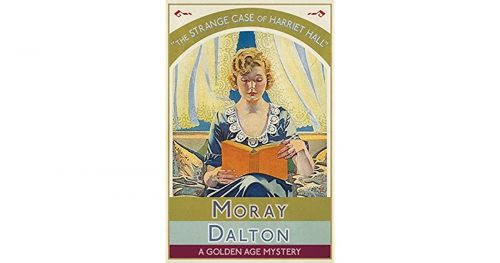
‘The reading public enjoys murders.’
So reflects a detective assigned to investigate a particular murder. Harriet Hall’s murder is certainly one the local press enjoy when the inquest reveals a rather sensational fact about the victim.
But who is Harriet? And why should we care that she’s been murdered?
What’s it about?
Miss Amy Steer is down on her luck and nearly out on her ear when a random newspaper advertisement connects her to a hitherto unknown relative, Aunt Harriet. Suddenly Amy has some money, some connections and a destination, but when she reaches her new home, her aunt is missing and her neighbours don’t seem sad about it.
Why did the otherwise friendly Deene family so dislike Harriet, an old friend of Mrs Deene? How long will Lady Lennor tolerate her son’s engagement to Lavinia Deene, when a dead body is discovered on Mrs Deene’s property? And why do none of the Deene family have a convincing alibi for the time of Harriet’s murder?
What’s it like?
A classic golden age murder mystery, reliant on coincidence and chatty villains who are quite happy to outline their entire schemes to their potential victim towards the close of the narrative.
The characters are all convincingly rendered: snooty Lady Lennor manipulates the weak willed Sir Miles Lennor, while self-centred Lavinia is mortified not by the death of her neighbour but by said neighbour having the audacity to put her engagement at risk, and the lovely Amy, an orphan whose kindness is matched by her naivety.
I enjoyed reading about the police investigation, which was initially hampered by the local colonel’s horror at having to investigate a crime committed on the local Lady’s land, but ultimately gains momentum as the visiting officers uncover Harriet Hall’s past. The lack of an alibi puts several characters in the frame, giving readers a genuine mystery to solve.
Final thoughts
I enjoyed reading this and, rather than feeling dated, it really feels quite modern in some ways – especially perhaps in the twist introduced in the epilogue! Describing it as a twist may not sound complimentary, so to be clear: as soon as this reveal occurred, I thought: of course, that had to be what happened.
I also thought this was an interesting story because of the poor parenting of adult children in evidence. Amy Steer gently chides her mother (in her own mind) for not providing her with a trade to ply and therefore leaving her vulnerable to the world; Mrs Deene lavishes all her love and affection on one of her three children, Lavvy, seeming to not even disregard but be irritated by the affection given to her by her youngest daughter, Mollie; and Lady Lennor rules Sir Miles without inspiring devotion from him. In fact, Lady Lennor’s last appearance in the novel is when her son mocks her and turns away from her, having been as defiant as he dares. One suspects Lady Lennor may almost end up wishing she had let him marry Lavvy after all! And yet, Lady Lennor is not simply a villain; we witness her tears and her loneliness, her gardening and her interactions with friends, seeing that actually, though she would hate to admit it, she does have something in common with Mrs Deene: a determination to do the best for her child.
I look forward to reading more by Moray Dalton, which is possible now Dean Street Press are making it their mission to republish forgotten treasures of the golden age of crime writing.
‘The Strange Case of Harriet Hall’,
Moray Dalton,
2019 Dean Street Press (originally published 1936)
Other golden age fiction titles revived by Dean Street Press include: